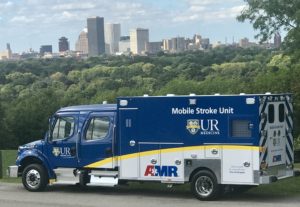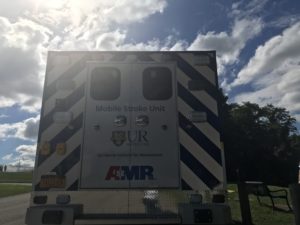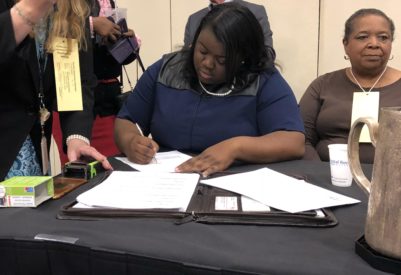
URMC News
Next month, UR Medicine will begin operation of a Mobile Stroke Unit (MSU), a high-tech ‘emergency room on wheels’ that is designed to provide life-saving care to stroke victims.

The $1 million unit will be operated in partnership with AMR as a community resource and represents a significant step forward for stroke care in the Rochester region. While the MSU resembles an ambulance on the outside, inside it contains highly specialized staff, equipment, and medications used to diagnose and treat strokes.

The unit is equipped with a portable CT scanner that is capable of imaging the patient’s brain to detect the type of stroke they are experiencing. The scans and results from a mobile lab on the unit are wirelessly transmitted to UR Medicine stroke specialists at Strong Memorial Hospital, who will consult with the on board EMS staff via telemedicine and decide if they can begin treatment immediately on scene.
If it is determined that the patient is experiencing an ischemic stroke – which account for approximately 90 percent of all strokes – the MSU team can administer the drug tissue plasminogen activator (tPA) to attempt to break up the clot in the patient’s brain. While en route to the hospital, UR Medicine specialists will continue to remotely monitor and assess the patient’s symptoms.
“The UR Medicine Mobile Stroke Unit essentially brings the hospital to the patient,” said Tarun Bhalla, M.D., Ph.D., Chief of Stroke and Cerebrovascular Surgery the UR Medicine Comprehensive Stroke Center. “This unit will improve care and outcomes by shortening the gap between diagnosis and treatment and enable us to initiate care before the patient reaches the hospital.”
It is estimated that 3,000 people in Monroe County suffer from a stroke every year. Stroke is the fifth leading cause of death and the number one cause of long-term disability in the U.S. However, if caught early, many stroke victims can make a full recovery.
“Ten years ago we realized there was an epidemic of stroke in our community which resulted in tremendous human suffering and health care costs,” said Web Pilcher, M.D., Ph.D., chair of the UR Medicine Department of Neurosurgery. “We decided to embark on a long-term plan to provide the best stroke care in upstate New York. The Mobile Stroke Unit represents the next evolution in that effort and places Rochester among an elite list of communities with this cutting-edge technology.”
The current best treatment for stroke is tPA. But in order to work properly, the drug must be given within four and half hours of the first stroke symptoms. Depending upon the circumstances, doctors may also elect to perform a minimally invasive endovascular surgical procedure that involves threading a catheter through the blood vessels and physically removing the obstruction in the brain. The capabilities provided by the MSU to diagnose, start treatment, and prepare hospital staff to receive the patient before they arrive at the emergency department will save lives and improve chances of recovery.
“In stroke care, time equals brain,” said Curtis Benesch, M.D., M.P.H., Chief of Stroke and Medical Director of the UR Medicine Comprehensive Stroke Center. “The approximately 30 minutes that could be saved by the Mobile Stroke Unit by starting treatment before a stroke patient reaches the hospital could mean the difference between the recovery of function or a lifetime of impairment.”
“Patients who receive tPA sooner are more likely to go home and retain the ability to walk and care for themselves,” said Bob Holloway, M.D., M.P.H., chair of the UR Medicine Department of Neurology. “The Mobile Stroke Unit will improve outcomes for stroke victims in our community and, because people with less disability use fewer health care resources, lower costs in the long term.”
The unit is owned by UR Medicine and will be operated by AMR. The MSU will be staffed by a UR Medicine nurse trained in stroke care and a CT technologist, an AMR paramedic and emergency medical technician, and remotely by a stroke specialist at UR Medicine.
The construction and operating costs of the unit, which was custom built by Frazer Ltd. in Houston, are being funded by UR Medicine and philanthropy, including a lead gift from Elena Prokupets and support from the Del Monte family and other donors in the Rochester community.
“We are extremely grateful to Elena for her gift to the School of Medicine and Dentistry, which has made it possible to bring this life saving technology to Rochester,” said Mark Taubman, M.D., CEO of the University of Rochester Medical Center. “Her generosity, along with the support of many others, has provided us the resources to invest in the infrastructure, technology, and clinical talent necessary to provide the most advanced stroke care to our community.”
The MSU is part of a broader UR Medicine initiative to bring state-of-the-art stroke care to the region.
This includes Strong Memorial Hospital’s designation as the region’s only Comprehensive Stroke Center by the Joint Commission, a certification that indicates that the hospital either meets or exceeds the highest standards of care required to provide timely, advanced, and coordinated care to patients with cerebrovascular disease, and the Neuromedicine Intensive Care Unit, a 12-bed ICU that provides care to critically ill patients with complex neurological life threatening illnesses such as stroke.
UR Medicine stroke specialists also provide 24/7 consultation services for emergency department personnel in several hospitals in the region via telemedicine.
Eight years ago, UR Medicine, in partnership with the Greater Rochester Health Foundation, created the Stroke Treatment Alliance of Rochester/New York (STAR-NY),to educate medical professionals and the broader community about stroke recognition and prevention.
The unit will be dispatched by the City of Rochester and Monroe County Emergency Communications Departments. For the first three months, the MSU will operate exclusively in the City of Rochester.
After this initial pilot period, the service will expand to the rest of the Monroe and Livingston County EMS region and UR Medicine and AMR are exploring ways to extend the availability of the service to neighboring counties over time. Patients being treated by the MSU will be taken to the nearest hospital with the appropriate level of care to treat their stroke or the hospital requested by the patient.
"The Mobile Stroke Unit is an amazing new tool for our 911 operators to use when a call comes in for a possible stroke," said Rochester Mayor Lovely Warren. "The precious seconds saved between diagnosis and treatment will translate into lives being saved and families remaining whole. I would like to than thank the University of Rochester, AMR, our team at 911, and all of the generous donors for their partnership and continued investment in our community."
“Stroke places a tremendous burden on our health care system and can have a devastating, lifelong impact on patients and their families,” said Michael Mendoza, M.D., M.P.H., the Commissioner of Health for Monroe County. “Based on the experience of other communities with this technology, we know that the Mobile Stroke Unit will enhance our region’s emergency response capabilities and help address a critical public health need by improving outcomes for stroke victims.”
The UR Medicine MSU is the only unit of its kind in upstate New York. The first MSU was launched in the U.S. in Houston in 2014. Since then, units have been deployed in several other cities, the closest being Cleveland and New York City.
For more information, visit: www.mobilestroke.urmc.edu





